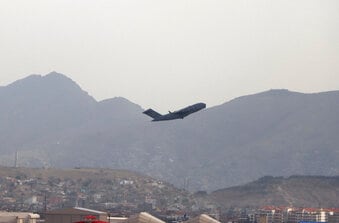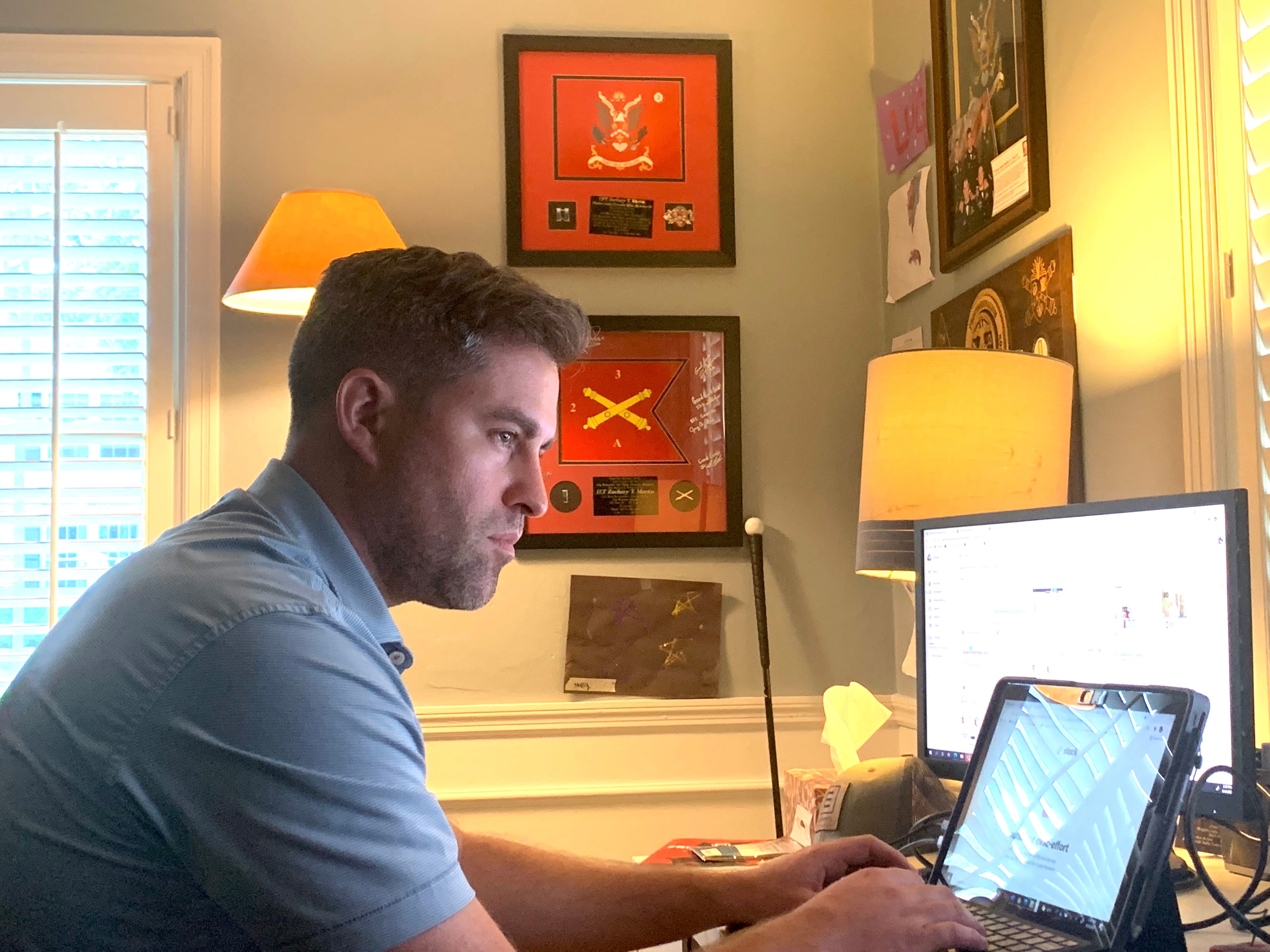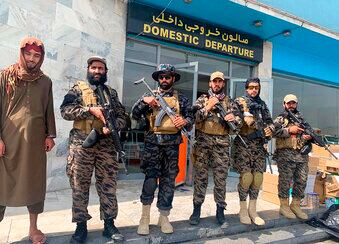It is shortly after midnight Tuesday Kabul time, a few minutes past the departure of the last U.S. troops from Afghanistan.
Standing outside Hamid Karzai International Airport, after watching the last U.S. military aircraft take off, Safar Ali Paiam ducks as he listens to the sound of the Taliban’s celebratory gunfire.
“The joyful firing of the Taliban for get out of the last flights of the US military from Afghanistan is heard now!,” he tells Military Times in a WhatsApp message. “Repeated firing and firing! Kabul looks like a war scene!”
Paiam is one of the tens of thousands of Afghans, quite possibly more, left behind after working with the U.S. over the course of this conflict.
With no good options, he is seeking what may be the least-worst route out of his homeland.
“I decided to flee to Pakistan,” says Paiam, a former interpreter for the U.S. military who wrote a commentary for Military Times about being captured and tortured by the Taliban.

Like so many others who have reached out to Military Times over the past two weeks, he is fearful of the future.
So, too, is the son of a former Afghan army officer, who spoke to Military Times on the condition of anonymity out of fear of Taliban reprisal.
“My father is still in hiding,” he says. “I told him to go to a third country, but he said it’s very difficult to pass the checkpoints and the border and his passport also expired.”
It is a fear that Marine Gen. Frank McKenzie, commander of U.S. Central Command, tacitly acknowledged Monday afternoon during his announcement that for America, it was wheels up after two decades in a conflict that took more than 2,400 U.S. lives, saw more than 20,000 wounded and cost taxpayers $2 trillion and counting.
“There’s a lot of heartbreak associated with this departure,” said McKenzie. “We did not get everybody out that we wanted to get out. But I think if we stayed for another 10 days, we wouldn’t have gotten everybody out that we wanted to get out and there still would have been people who would have been disappointed with that.
“It’s a tough situation,” he added. “But I want to emphasize again that simply because we have left, that doesn’t mean the opportunities for both Americans that are in Afghanistan that want to leave and Afghans who want to leave, they will not be denied that opportunity. I think our Department of State’s gonna work that very hard in the days and weeks to come.”
In a later briefing, Secretary of State Antony Blinken vowed that the U.S. would work to evacuate the remaining several hundred Americans and an unknown number of Afghan allies.
RELATED

Time to pivot
For those who’ve worked tirelessly over the past 18 days trying to rescue Americans and Afghan allies caught in the Taliban’s rapid sweep across Afghanistan, the heartbreak McKenzie spoke of is palpable. Hours after his message, the reality of the situation sinks in.
“We have an all-hands meeting in a few minutes,” says Mike Jason, a retired Army colonel who served in Afghanistan and helped create Allied Airlift 21, which sprung up to rescue those who helped the U.S. “We’ve got to give the team permission to grieve and send them home.”
For Jason, the organization’s interim executive director, the last U.S. flight out of Kabul meant a pivot from ground operations that he said helped rescue between 500 and 700 people.
“We are telling them that we are no longer capable of our operational contributions on the ground,” said Jason. “We are cutting that off and focusing on validating and cleaning up lists and getting them to the proper authorities and pivoting to what’s next.”
Jason acknowledged he is not sure what is next.
“I think we will individually focus on advocating for those who are coming here to resettle, to live life with honor and dignity and bear witness and advocate for those left behind,” he said.
For his network of volunteers, the past 18 days have been “intense.
“Everyone sort of sacrificed jobs, families,” he said. “it’s been 24/7. Right now, we are at a reflection point. We have to grieve and celebrate the small victories we were able to make.”

“I am losing my mind, that’s what I’m doing,” says Andy Wilson, a retired special forces NCO, now CEO of Quiet Professionals, a defense contracting company in Tampa, Florida.
Wilson, who served with Delta Force and the 3rd Special Forces Group, has been running a rescue operation leveraging his contacts and company.
Like Allied Airlift 21, Wilson, says his network must adjust.
“We are actively assisting to build rat lines, working on air assets, getting them located in different places across the country to fly people out,” he says. “We anticipate cell service will be shut down pretty soon, and we are making sure we have other means of communications.”
As with other organizations, Wilson has built a tracker for those wishing to escape.
“We have well over 4,000 on our tracker,” he says. “We promise not to shut down until the last person who wants to leave Afghanistan can leave.”
Wilson, who estimates his network helped save at least 100 American citizens and Afghans, said he is meeting with potential large donors, members of Congress and others who can help continue the mission.
Too busy nailing down details, neither Jason nor Wilson paid too much attention to the briefings at Pentagon and State.
Jason said that he holds out hope knowing that the U.S. has the capability to rescue Americans in extremis if needed and that there were many lessons learned to be shared from Allied Airlift 21.
“I do believe this administration and hopefully future administrations — this will not be over in two or three years — will honor America’s promise,” he said. “Our operation, and me as an individual, will continue to bear witness and tell the story of those left behind that we still owe an evacuation.”
Wilson, for his part, said he is putting his faith in the network of volunteers who have worked so hard over the past 18 days.
“I have faith in myself and faith in other groups involved in my network,” he said. “I have faith in what I can control and know we are capable of.”
Hope sinks
About 132,000 people were evacuated, but at the cost of 13 more American troop deaths and scores more Afghan lives — with untold numbers still trapped.
Like Safar Ali Paiam.
“The situation is not good,” he said. “It is really horrific and dangerous.”
For Afghans like him left behind, faith and hope in what America can do is fading.
“I am not sure,” he said when asked if he trusts that the U.S. will fulfil Blinken’s vow.
“I don’t trust,” said another former interpreter, who requested anonymity out of fear of Taliban reprisal, when asked about the promises made by McKenzie and Blinken. “I want to say to the U.S. secretaries, please be honest with the people who put their lives in danger who helped you. They were honest with you, but you don’t be honest with the people.”
The son of the former Afghan army officer still in hiding is all out of hope.
“I hope it works out and help my family,” he said. “to be honest with you, I don’t care about anything. I lost my country. I don’t have any hope for it to be better.”
Howard Altman is an award-winning editor and reporter who was previously the military reporter for the Tampa Bay Times and before that the Tampa Tribune, where he covered USCENTCOM, USSOCOM and SOF writ large among many other topics.





